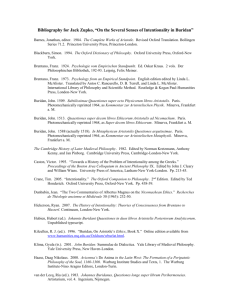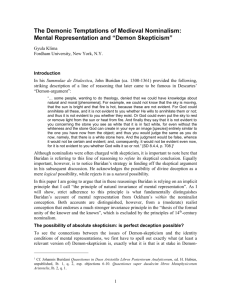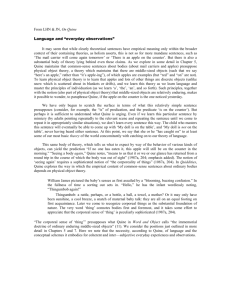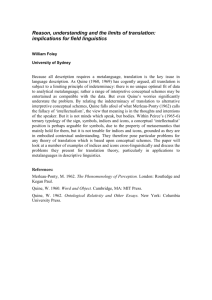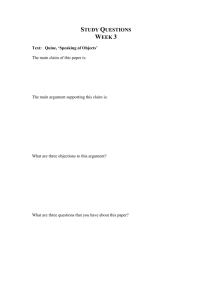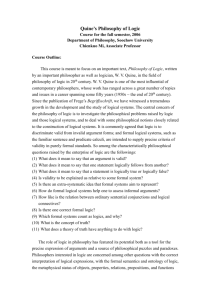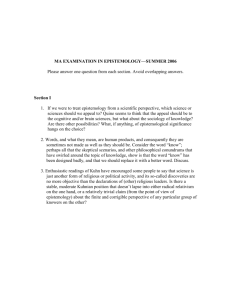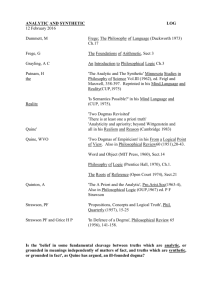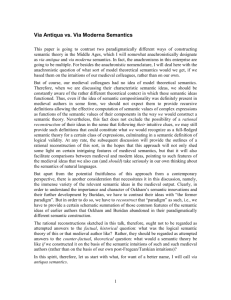Quine, Wyman, Buridan
advertisement
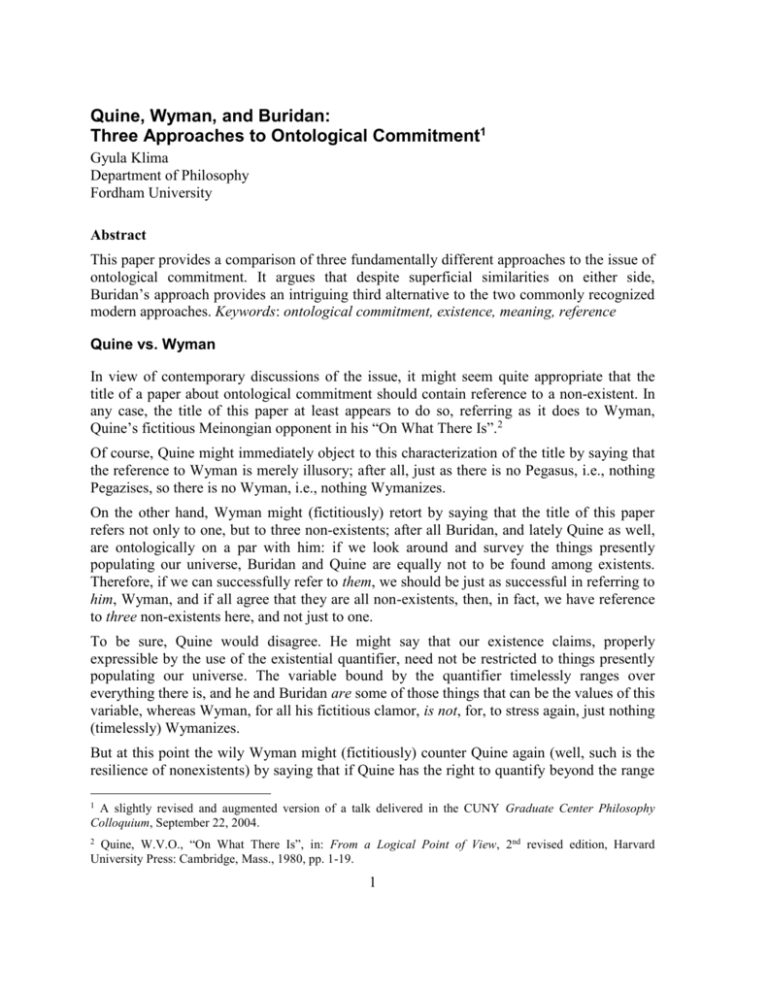
Quine, Wyman, and Buridan: Three Approaches to Ontological Commitment1 Gyula Klima Department of Philosophy Fordham University Abstract This paper provides a comparison of three fundamentally different approaches to the issue of ontological commitment. It argues that despite superficial similarities on either side, Buridan’s approach provides an intriguing third alternative to the two commonly recognized modern approaches. Keywords: ontological commitment, existence, meaning, reference Quine vs. Wyman In view of contemporary discussions of the issue, it might seem quite appropriate that the title of a paper about ontological commitment should contain reference to a non-existent. In any case, the title of this paper at least appears to do so, referring as it does to Wyman, Quine’s fictitious Meinongian opponent in his “On What There Is”.2 Of course, Quine might immediately object to this characterization of the title by saying that the reference to Wyman is merely illusory; after all, just as there is no Pegasus, i.e., nothing Pegazises, so there is no Wyman, i.e., nothing Wymanizes. On the other hand, Wyman might (fictitiously) retort by saying that the title of this paper refers not only to one, but to three non-existents; after all Buridan, and lately Quine as well, are ontologically on a par with him: if we look around and survey the things presently populating our universe, Buridan and Quine are equally not to be found among existents. Therefore, if we can successfully refer to them, we should be just as successful in referring to him, Wyman, and if all agree that they are all non-existents, then, in fact, we have reference to three non-existents here, and not just to one. To be sure, Quine would disagree. He might say that our existence claims, properly expressible by the use of the existential quantifier, need not be restricted to things presently populating our universe. The variable bound by the quantifier timelessly ranges over everything there is, and he and Buridan are some of those things that can be the values of this variable, whereas Wyman, for all his fictitious clamor, is not, for, to stress again, just nothing (timelessly) Wymanizes. But at this point the wily Wyman might (fictitiously) counter Quine again (well, such is the resilience of nonexistents) by saying that if Quine has the right to quantify beyond the range 1 A slightly revised and augmented version of a talk delivered in the CUNY Graduate Center Philosophy Colloquium, September 22, 2004. Quine, W.V.O., “On What There Is”, in: From a Logical Point of View, 2nd revised edition, Harvard University Press: Cambridge, Mass., 1980, pp. 1-19. 2 1 of present existents to include Buridan and himself, then he, Wyman, has entirely equal rights to quantify over himself, thereby including himself among things that there are, as a timeless “Wymanizer”, as it were, while still excluding himself from among (present) existents. To this Quine might say that no, Wyman cannot quantify over himself, since he is just not there to be a value of a bound variable. But then again, Wyman could say that yes, he is there too, just as well as Quine and Buridan are, since he is there for quantification just as equally as they are equally not among present existents, for at this time Quine and Buridan are certainly no more real than he is. And then to Quine’s every ‘no’ he might just reply ‘yes, a gazillion times!’ In the ensuing virtual impasse, Buridan might calmly emerge and expound the view the rest of this paper is about. Buridan’s possible reaction In the first place, Buridan might note that he finds the entire business of trying to determine how many non-existents are referred to in the title of this paper specious. For on his view of reference, or rather, on his view of the corresponding semantic function of terms in his theory, namely, supposition, it is something that belongs to terms only in propositions. That is to say, referring, or (to use the common modern transcription of Buridan’s terminology) suppositing is something only the categorematic terms of propositions, i.e., their subjects and predicates do. But the title of this paper is not a proposition. Ergo, the terms in the title do not refer to or supposit for non-existents, for they do not refer or supposit at all. Thus, Buridan would agree with Quine that the name ‘Wyman’ in the title does not refer to Wyman, but not, as Quine would say, because nothing Wymanizes (although, as we shall see, Buridan would agree with that claim too), but because none of the names in the title refer to anything, since in that context they simply do not have the function of referring or suppositing. To the possible objection that the terms must refer to something in the title too, since they certainly bring to our mind the objects they intend to name, Buridan would briefly reply that the objection mixes up two distinct functions of terms, namely, meaning and naming, or in his terminology, signifying and suppositing. Thus, Buridan would absolutely agree with Quine’s remarks that “a singular term need not name to be significant”3 and that “there is a gulf between meaning and naming even in the case of a singular term which is genuinely a name of an object”.4 Buridan’s theories of signification and supposition In fact, Buridan would distinguish not only between meaning and naming, or in his terminology, between signification and supposition, but even between two different sorts of 3 Ibid., p. 9. 4 Ibid. 2 signification, namely, immediate and ultimate signification, and, correspondingly, between two different sorts of supposition, namely, material and personal supposition. What a term immediately signifies is the mental act on account of which we recognize the term as a significative utterance or inscription, as opposed to some articulate sound or discernible scribble that makes no sense to us at all. If I utter the sound ‘biltrix’, it might sound like a word of an articulate human language, and in fact there may be a human language in which it is meaningful (I don’t know), but as far as I can tell, it is only Boethius’ example of a meaningless utterance in his commentary on Aristotle’s On Interpretation to illustrate the difference between articulate sounds that do and those that don’t make any sense to us. The latter sort of utterances lack signification precisely because they do not generate any understanding in the mind of the listener. That is to say, upon hearing such an utterance we literally have no idea what the speaker intends by it, if anything at all, because such an utterance simply gives rise to no act of understanding in our mind. Thus, those utterances that do have signification are meaningful precisely because they are associated with some act of understanding, or, in late-scholastic terminology, because they are subordinated to some concept of the human mind, whatever such a concept is, namely, whether it is some spiritual modification of an immaterial mind or it is just a firing pattern of neurons in the brain. The point is that without a subordinated concept an utterance makes no sense, since for it to make sense is nothing but to evoke the concept to which it is subordinated. But this is not to say that what we mean by our categorematic terms are our concepts. For by means of these concepts we conceive of the objects of these concepts, again, whatever these concepts are and whatever those objects are in their own nature. A categorematic term, therefore, is said to signify the concept to which it is subordinated immediately, but it is imposed to signify ultimately the object or objects conceived by this concept, in the manner it is or they are conceived by means of this concept. For example, by means of the concept immediately signified by the term ‘Quine’ in our minds, we conceive in a distinctive, singular fashion of the single person we all know and admire as one of the greatest philosophers of the 20th century. So the term ‘Quine’ ultimately signifies the person, Quine, to us, even if he is no longer among us, because we can still conceive of him, just as we can conceive of any other person we know, even if he or she is not present in our sight, and even if we may just not know that he or she is no longer among present existents. Indeed, we can also conceive of Quine and any other person we know, and even of persons we don’t know indifferently, in a universal fashion, by means of the concept immediately signified by the term ‘human’ regardless of whether they actually exist, and regardless of whether we know whether they exist. Thus, Buridan would say that the term ‘human’ ultimately signifies all humans indifferently, just as the concept of humans represents all humans indifferently, regardless of whether they are present to us or not and whether they presently exist or not. But just because these terms signify Quine or all humans in the ways described, it does not mean that they refer to or supposit for them. For, as I have said, terms supposit only in their function of subjects or predicates of propositions. Indeed, the same term, signifying the same, may supposit for different things, or for the same things in different ways in different contexts, or for some things in some context and for 3 nothing in another. The medieval theory of supposition was devised precisely to describe how the same terms with the same significations may supposit in different contexts for different things or for the same things in different ways or for nothing at all.5 For example, in the proposition ‘Man is a noun’, the term ‘man’ is obviously used not to stand for what it ultimately signifies, namely, individual humans, but for itself, or any other token-word of the same type. Again, in the context of the proposition ‘Man is a species’, the same word is still not used to stand for its ultimate significata, but rather to stand for its immediate significata, that is, for the mental act in my mind whereby I conceive of humans indifferently, or for the similar mental act in your mind, whereby you conceive of the same things in the same way, etc. In these cases, when the term is not used to stand for what it was imposed to signify, that is, when it is used non-significatively, Buridan would say it has material supposition. By contrast, in personal supposition, when a term is used significatively, it is used to stand for its ultimate significata. For example, in the proposition ‘Every man is an animal’ the term ‘man’ is used to stand for what it is imposed to signify, that is, individual humans, its personal supposita. But, as I have already indicated, the supposition of a term is variable not only with respect to its kind, namely, when the question is whether the term supposits for itself or its immediate or ultimate significata, but also with respect to its range over the term’s ultimate significata, when the question is which of its ultimate significata the term supposits for in the given context, if for any at all. This question is the business of Buridan’s theory of ampliation and restriction of personal supposition.6 Buridan’s theory of ampliation and restriction The basic idea of the theory is very simple. Tenses and modalities, terms implying in their meaning tenses or modalities, as well as verbs and their derivatives that signify the acts of our minds which enable us to be aware of different tenses and modalities generate ampliative contexts, in which the range of supposition of the terms with which they are construed is ampliated, i.e., extended to those of their significata that may not be presently existing. But in non-ampliative contexts the supposition of terms is restricted to presently existing things. As I have already noted, since a common term indifferently signifies all things of a given kind, abstracting from whether they actually exist or not, in the appropriate context it may certainly supposit for those of its significata that do not actually exist. For example, the term ‘dinosaur’, being a common term subordinated to a universal concept whereby we indifferently conceive of all dinosaurs, indifferently signifies all dinosaurs, despite the fact that none of them presently exists, although they did exist in the past. So, in 5 For an excellent recent survey of the relevant medieval theories and for further references, see Read, Stephen, “Medieval Theories: Properties of Terms”, The Stanford Encyclopedia of Philosophy (Spring 2002 Edition), Edward N. Zalta (ed.), URL = http://plato.stanford.edu/archives/spr2002/entries/medieval-terms/. 6 Actually, Buridan might as well have the same type of theory concerning material supposition, just as he could have one concerning the modes of supposition (that deals with the different ways in which the same term can supposit for the same individuals in different contexts), but he simply does not discuss these issues, probably because the analogous application of the corresponding distinctions would be just too obvious. 4 the past tense proposition ‘Dinosaurs roamed the earth before man appeared’ the term ‘dinosaurs’ supposits for dinosaurs that existed in the past, even if presently no dinosaurs exist. But in the present tense proposition ‘Dinosaurs roam the earth’ where its supposition would be restricted to its presently existing significata, their being no such significata, the same term supposits for nothing, and so the proposition is false. To be sure, Buridan also considers the case of present tense propositions intended to convey not just some factual claim, but a “law-like statement”, such as ‘Dinosaurs are reptiles’. When such claims are put forward with the obvious intention of talking about any of the significata of the term, regardless of whether they actually exist, Buridan would say the term has natural supposition for all the things it signifies, for such claims are the characteristic expressions of laws of nature. But properly speaking, when an affirmative proposition is simply used to make a factual claim without producing an ampliative context for its terms, its truth requires the actual existence of its terms’ personal supposita. For according to Buridan’s analysis of such categorical propositions, their truth requires that their terms supposit for the same thing or things, and, as he put it, non enti nihil est idem vel diversum – nothing is identical with or diverse from a non-being.7 So, affirmative propositions whose terms supposit for nothing are false, and thus their contradictory negations are true. For instance, ‘Every winged horse is winged’ is false, because there are no winged horses. Therefore, its contradictory negation, ‘Not every winged horse is winged’ is true. To be sure, this means that if we take this to be equivalent to ‘Some winged horse is not winged’, then, perhaps counterintuitively, we have to conclude that the latter is also true, just as Buridan did. But Buridan accounts for our contrary intuition by distinguishing between the negative ‘Some winged horse is not winged’, and the affirmative ‘Some winged horse is non-winged”, only the latter of which carries existential import. So, there being no winged horses, the affirmative proposition is false, whereas the negative proposition is true, just as it should be, given the falsity of its contradictory negation, the affirmative ‘Every winged horse is winged’. This is how Buridan, and medieval logicians in general, get a neat traditional square of opposition and all traditional syllogistic forms without having to assume the non-emptiness of their terms. Accordingly, Buridan’s above-quoted dictum to the effect that a non-being is not identical with or diverse from anything must not be understood as expressing some profound metaphysical truth about the nature of non-beings. After all, non-beings are just not there to have a nature in the first place. This negative claim is simply true because nothing is a nonbeing, and so the subject term of the negative proposition ‘a non-being is not identical with or diverse from anything’ supposits for nothing. In fact, attributing existential import to affirmatives and making the distinction between contradictory negation and term-negation, Buridan can easily answer Quine’s perplexing questions about the possible fat man in that doorway and the possible bald man in that 7 John Buridan, Summulae de Dialectica, an annotated translation with a philosophical introduction by Gyula Klima; New Haven: Yale University Press, 2001, (henceforth: SD), p. 827. 5 doorway, when there is nobody in that doorway. Are they the same? No. Are they not the same? Yes. So, if they are not the same, are they different? No, and non sequitur, because the affirmative ‘A is different from B’ cannot follow from the negative ‘A is not the same as B’, given that the negative is true when its terms supposit for nothing, whereas the affirmative in that case is false. So, the answer to the question of how many merely possible men are standing in the doorway must be ‘none’, which makes the rest of the questions about how many of them are similar or dissimilar, etc., simply pointless. On the other hand, since we are talking about possiblia, we can certainly provide true affirmative answers to the corresponding, appropriately modalized questions concerning the possible fat man and the possible bald man who could be standing in the doorway. Could they be different? Yes, given the fact that it is certainly possible for a single bald man and for single fat man to stand in the doorway (well, provided they would fit in together). For on account of this possibility we can form the true affirmative proposition ‘the possible fat man in the doorway could be different from the possible bald man in the doorway’. But could they be the same? Of course, they could, given that it is clearly possible for a single fat, bald guy to stand in the doorway. For on account of that possibility, this affirmative proposition is true: ‘the possible fat man in the doorway could be the same as the possible bald man in the doorway’ (reading ‘could’ with wide scope or, as Buridan would say, reading the sentence in sensu composito). But could we talk in the same way about impossibilia? For example, could we successfully refer to a round square, say, in the context of the sentence ‘The round square to be drawn on the blackboard could be round’? Clearly, since a round square just cannot be, it cannot be anything, not even round. Furthermore, since nothing can possibly be a round square and ‘could’ can only ampliate reference to possibilia, the subject of this affirmative sentence refers to nothing, whence the sentence is obviously false, precisely because of the failure of its subject to refer to anything. But don’t we have at least something in mind when we are talking about round squares? And even if we perhaps cannot imagine or genuinely conceive of round squares because we immediately realize the inconsistency of their concept, what about the cases of impossibilia that we do not immediately recognize as such or of which we just have no idea that they are impossible? What about the case of someone talking about the greatest prime number, failing to realize that assuming its existence leads to a contradiction? Doesn’t this person refer to something at least in an appropriate ampliative context, say, in the context of the sentence ‘What I am thinking about is the greatest prime’? In such cases we have to distinguish between what the speaker (mistakenly) takes himself to refer to and what the phrase he uses refers to. For of course it is possible for someone to think, mistakenly, that what he is thinking about is the greatest prime. But what he is thinking about is not, since it cannot be, the greatest prime, but merely an object of his thought of which he mistakenly believes that it is the greatest prime. Therefore, when he says ‘The greatest prime is what I am thinking about’ what he says is false, since the subject of his affirmative sentence refers to nothing. So, although this person does not refer to the greatest prime by the definite description in this sentence, still, it is true that he mistakenly takes himself to be referring to the greatest prime. 6 To be sure, the definite descriptions in the propositions just considered are singular terms, and, as Buridan himself remarks, in the case of singular terms one cannot properly speak about ampliation8, i.e., extending the range of their supposition to their non-existing significata, since they only have one significatum. But even so, Buridan can certainly stipulate that if its significatum is not among present existents, then in non-ampliative contexts a singular term cannot supposit for its significatum, although in the appropriate ampliative context it can. So, given that Wyman does not exist, he is not anywhere, and he does not do anything, since he is simply not any thing. In short, as Quine would put it, just nothing actually Wymanizes. Still, we can truly say that Wyman could be somewhere, and that he is imagined to be doing something, and that for that reason he could be something. That is to say, something could be Wymanizing. Accordingly, when we are thinking of Wyman, given the ampliative force of the verb ‘thinking’, we can truly say that we are thinking of someone who does not exist. Indeed, when we are thinking of Quine, now we are thinking of someone else who does not exist either, although someone who existed in the past. However, according to Buridan, from this we cannot conclude that when we are thinking of Quine, or of Wyman, then we are thinking of a non-existent, or a non-being. For according to him, a non-being cannot be thought or understood. Buridan considers this issue in his Sophismata, the characteristically medieval collection of logical puzzles, systematically dealing with problem-sentences, just like our modern problem-sentences about the present King of France, or about Pierre who believes London is pretty. The question Buridan raises is whether the sophisma (problem-sentence): ‘A nonbeing is understood’ is true. First, he lays down that the proposition is affirmative with an infinite subject, that is to say, the negation preceding the term ‘being’ is a narrow-scope term-negation, and not a propositional negation, so the entire proposition is affirmative. Hence he argues for its truth as follows:9 […] the sophism is proved: for such infinite terms are analyzed so that saying 'A non-man runs' is equivalent to saying 'What is not a man runs'. And thus saying 'A non-being is understood' is equivalent to saying 'What is not a being is understood'. But the second is true, for Antichrist, who is not a being, is understood. Next, Buridan argues for the opposite side before resolving the issue: O.1 The opposite is argued: for the term 'non-being' supposits for nothing, but a proposition is false if its subject supposits for nothing and it is affirmative; therefore, etc. In his response, Buridan sides with the second position, namely, that the sophism is false, and argues for this position on the basis of his theory of ampliation. I respond that the sophism is false, for the term supposits for nothing. And this is clear in the following manner: for the verb 'to understand' or 'to be understood' ampliates supposition to 8 SD, p. 918. 9 SD, p. 923 & ff. 7 past, and future, and even all possible things. Therefore, if I say, 'A being is understood', the term 'being' supposits indifferently for every present or past or future or possible thing. But the rule is that an infinitizing negation added to a term removes its supposition for everything for which it supposited and makes it supposit for everything for which it did not supposit, if there are any such things. Therefore, in the proposition 'A non-being is understood', the term 'non-being' does not supposit for some present, nor for some past, nor for some future, nor for some possible being; therefore, it supposits for nothing, and so the proposition is false. And I say that 'A non-being is understood' and 'What is not a being is understood' are not equivalent, for by the verb 'is' you restrict the infinity [infinitatem] to present things. Therefore, the supposition for past and future [and possible] things remains, and thus this has to be conceded: 'What is not [a being] is understood'. If, therefore, we are to give an equivalent analysis of 'A non-being is understood', then it will be the following: 'What neither is, nor was, nor will be, nor can be is understood', and this is false, just as the sophism was. In another passage Buridan makes the point even more vividly, discussing the issue of whether we should accept any reference to things that do not exist: … a name signifies what is understood by it when it is put in an expression, for to signify is to give rise to some understanding of a thing [intellectum rei constituere]. But by the name ‘rose’ we understand a rose and by the name ‘roses’ we understand roses, even if there are no roses. For example, [suppose] last year we, you and I, saw many red roses together. If I ask you: ‘The roses we saw were red, weren’t they?’, then you say: ‘Indeed’. And you know this to be true. But you wouldn’t know this, unless you thought of those roses. Therefore, by the name ‘roses’, when I say ‘We saw roses’, you understand those things that we saw. But we saw red roses. So you think of roses. [… Accordingly, in this proposition] the name ‘roses’ supposits for roses, although nothing is a rose, for according to the above-mentioned case, namely, that last year we saw many red roses, you concede the proposition ‘There were many red roses last year’, and you know that this is true. And since this is an affirmative [proposition], it would not be true, unless its subject, which is the name ‘roses’, supposited for some thing or some things. But it does not supposit for [any] other thing or other things, but roses. [… Now] we should note that we can think of things without any difference of time and think of past or future things as well as present ones. And for this reason we can also impose words to signify without any difference of time. For this is the way names [as opposed to verbs] signify. Therefore, by the specific concept of ‘man’ I conceive indifferently all men, present, past and future. And by the name ‘man’ all [men] are signified indifferently, present, past and future [ones alike]. So we truly say that every man who was was an animal, and every man who will be will be an animal. And for this reason it follows that the [verbs] ‘think/understand’ [‘intelligere’], ‘know’, ‘mean/signify’ [‘significare’] and the like, and the participles deriving from them, ampliate the terms with which they are construed to refer indifferently to present, past and future and possible [things] which perhaps neither are, nor will be, nor ever have been. Therefore, even if nothing is a rose, I think of a rose, not one that is, but one which was, or will be, or can be. And then, when it is said: the name ‘rose’ signifies something, I concede it. And when you say: that [thing] is not, I concede that, too; but it was. If, then, you conclude: therefore, something is nothing, I deny the consequence, for in the major premise the term ‘something’ was ampliated to past and future [things], and in the conclusion it is restricted to present ones. 10 So, the upshot of Buridan’s discussion is that he would absolutely agree with Quine: nothing is a non-being; everything is a being, everything exists, and it is not true that something does not exist. Still, Quine would not be happy with Buridan’s solution. 10 Johannes Buridanus: Questiones Longe super Librum Perihermeneias, ed. Ria van der Lecq, Utrecht, 1983, pp.12-14. 8 For even if Buridan would agree with Quine and disagree with Wyman on the claim that everything exists, or, equivalently, that it is not the case that something does not exist, Quine would be quite unhappy with Buridan’s reasons for agreeing with him. Indeed, he might even regard Buridan as the wolfish Wyman in sheep’s clothing, overtly agreeing with his claims denying non-existents in assertoric contexts, while smuggling them back through the backdoor, by sneakily quantifying over them in his so-called “ampliative contexts”, thereby re-creating Wyman’s bloated universe. Conclusion: Buridan’s alternative So whose side is Buridan really on? Would Quine’s charge be justified? Is Buridan, and for that matter almost everybody else in the medieval logical tradition, really just a “cryptoWyman”? To see how Buridan’s position is related to the other two competing positions as contrasted by Quine, let me first try to restate it in terms that make it more easily comparable to both. As I have argued in a more technically oriented earlier paper of mine, the best way to reconstruct Buridan’s theory using modern logical tools is in terms of a quantified modal semantics with restricted variables representing Buridan’s common terms in their referring function.11 In this reconstruction, the ranges of these restricted variables may be “cut off at the edge” of the domain of the actual world, or they may go beyond this domain to pick up individuals from the domains of possible worlds, depending on the context in which these variables occur. Even without going into technical details, I think it is clear that in such a semantic system one may easily construct formulae representing Buridan’s claims that come out as true in models representing the situations in which Buridan would say those claims are true. So, in this regard the reconstruction would absolutely faithfully represent Buridan’s ideas. But then it might seem that the same reconstruction equally justifies Quine’s possible charges of “crypto-Wymanism” on Buridan’s part: in this system there is “quantification over nonexistents” all over the place. So even if Buridan’s claim that nothing is a non-being reconstructed in the object-language of the system would come out as true, in the metalanguage of the same system we could perfectly consistently say that he is committed to nonentities after all, on account of his quantifying over non-entities, i.e., entities in the domains of possible worlds, in his “ampliative” contexts. Accordingly, the situation is this. The object-language formula of the system representing Buridan’s claims that nothing is a nonbeing or that everything exists would come out as true, indeed, as logically true. Still, in the meta-language of the system it is equally true that some values of some of Buridan’s variables are in the domains of possible worlds; so on Quine’s criterion, some values of some of Buridan’s variables do not exist; that is to say, in the meta-language of the system it is true For technical details see Klima, G. (2001) “Existence and Reference in Medieval Logic”, in: A. Hieke – E. Morscher (eds.): New Essays in Free Logic, Kluwer Academic Publishers, 2001, pp. 197-226. (Available online: http://www.fordham.edu/gsas/phil/klima/medphil/Freelogic.pdf) 11 9 that something does not exist. Therefore, the semantic system in its meta-language is clearly committed to mere possibilia on Quine’s criterion. So, it might seem that Buridan’s semantics, represented by this semantic system, is equally committed to mere possiblia, that is to say, Quine’s possible charges are justified. But the tricky thing about Buridan’s semantics is that it makes no distinction comparable to the modern distinction between object-language and meta-language, so it has no meta-language comparable to the meta-language in which we see Quine’s charges justified. Buridan has only one language to talk about the world as well as about the language and its semantic relations to the world. And in that one language we cannot truly say that there are mere possibilia, or that something that is merely possible exists. Accordingly, from this Buridanian perspective, the issue of ontological commitment in terms of a meta-linguistic description of the relationship between language and the world is radically ill-conceived. From this Buridanian perspective, one cannot make claims about the relationships between language and reality from some external, God-like position, from the position of the user of a meta-language, who has a certain “context-free” or “context-neutral” access to the objectlanguage and “the world”, both as it is in itself and as it is conceived by users of the objectlanguage, that is to say, the totality of semantic values of items in that language. We only have this one language we actually speak (where, of course, it doesn’t matter which particular human language we take this one language to be), and we can speak about those semantic values only by means of the context-dependent ways of referring that are afforded to us by this language. But speaking this one language, Buridan would absolutely reject the “Meinongian” claim that something does not exist, and would side with Quine, saying that everything exists, despite the fact that he would also endorse the claim that we can think of, signify and refer to things that do not exist, given the ampliative force of ‘think’, ‘signify’ and ‘refer’. For even if we do not have a separate meta-language, we certainly can reflect on the relationships between this language and what it is about; that is to say, in these reflections we use the same language to talk about its semantic relations. But our language is about whatever we can think of, and we certainly can think of things beyond our narrower or broader actual environment. So, talking about the semantic relations of our language will necessarily generate ampliative contexts, without, however, committing us in this language, the only language we have, to any spurious existence-claims or actual property-claims concerning things we can talk about, but do not exist. Therefore, when we are thinking of something that does not exist, we are not exploring a mysterious realm of non-beings, say, the realm of merely possible or fictitious beings, for, pace David Lewis, there is just no such a realm to be explored. A merely possible being or a fictitious entity is not just a special kind of entity; indeed, not any more than a fake diamond is a special kind of diamond or forged money is a special kind of money. Just as a fake diamond is not something that is a diamond and is fake and forged money is not something that is both money and forged, so a fictitious entity is not something that is both an entity and is fictitious. And just as a fake diamond is no diamond at all, and forged money is no money at all, so a fictitious entity is not an entity at all. 10 But then what are these things we have in mind when we are thinking about things that do not exist? Well, some of them are things that existed, but no longer exist, others are things that will exist, but not yet exist, and still others are things that could exist, but actually don’t. But what is the nature of these things? Well, nothing, just as these things are nothing, i.e., none of the things there are. In short, Buridan’s metaphysical point is that if you want to do metaphysics, then you should deal with being qua being, and not with non-being qua being, for then, assuming a contradiction, you might just draw any silly conclusion. After all, ex impossibli quodlibet. Now whether we like it or not, this is certainly an interesting theoretical alternative, which is quite unparalleled in contemporary discussions, perhaps, because in those discussions we usually presuppose our access to the perspective of a meta-language. Indeed, it might appear that we do so with good reason, provided that Tarski is right about semantic closure and the imminent paradoxes it engenders. However, Buridan has more tricks up his sleeves. He would argue that Tarski was not quite right about the inevitability of Liar-type paradoxes under the conditions of semantic closure. According to him, the paradoxes only emerge because of our unwitting and unrestricted assent to Tarskian biconditionals, which is fine for non-reflective uses of the language, but generates paradox in its reflective uses. Accordingly, the solution Buridan offers is not an overall split between object-language and meta-language, but a more careful regulation of the reflective uses of the same language. In any case, if Buridan is right about rejecting, or just doing without, the Tarskian distinction, then he may be just as right about rejecting what he would justifiably regard as the “philosophical mirage” of ontological commitment through quantification. But the further details of this approach would have to be explored in the context of a systematic analysis of Buridan’s closed, token-based semantics.12 Nevertheless, I hope that even the present discussion already illustrated why the study of Buridan (or the history of philosophy in general) can be philosophically so rewarding: this study can put our own philosophical problems in an entirely different light, providing us with such theoretical perspectives that otherwise might entirely escape us as we are working in our set ways determined by the intellectual habits of our philosophical period, which in modern times tends to stretch to a mere couple of decades. Klima, G. “Consequences of a Closed, Token-Based Semantics: The Case of John Buridan”, History and Philosophy of Logic, 25(2004), pp. 95-110. 12 11
